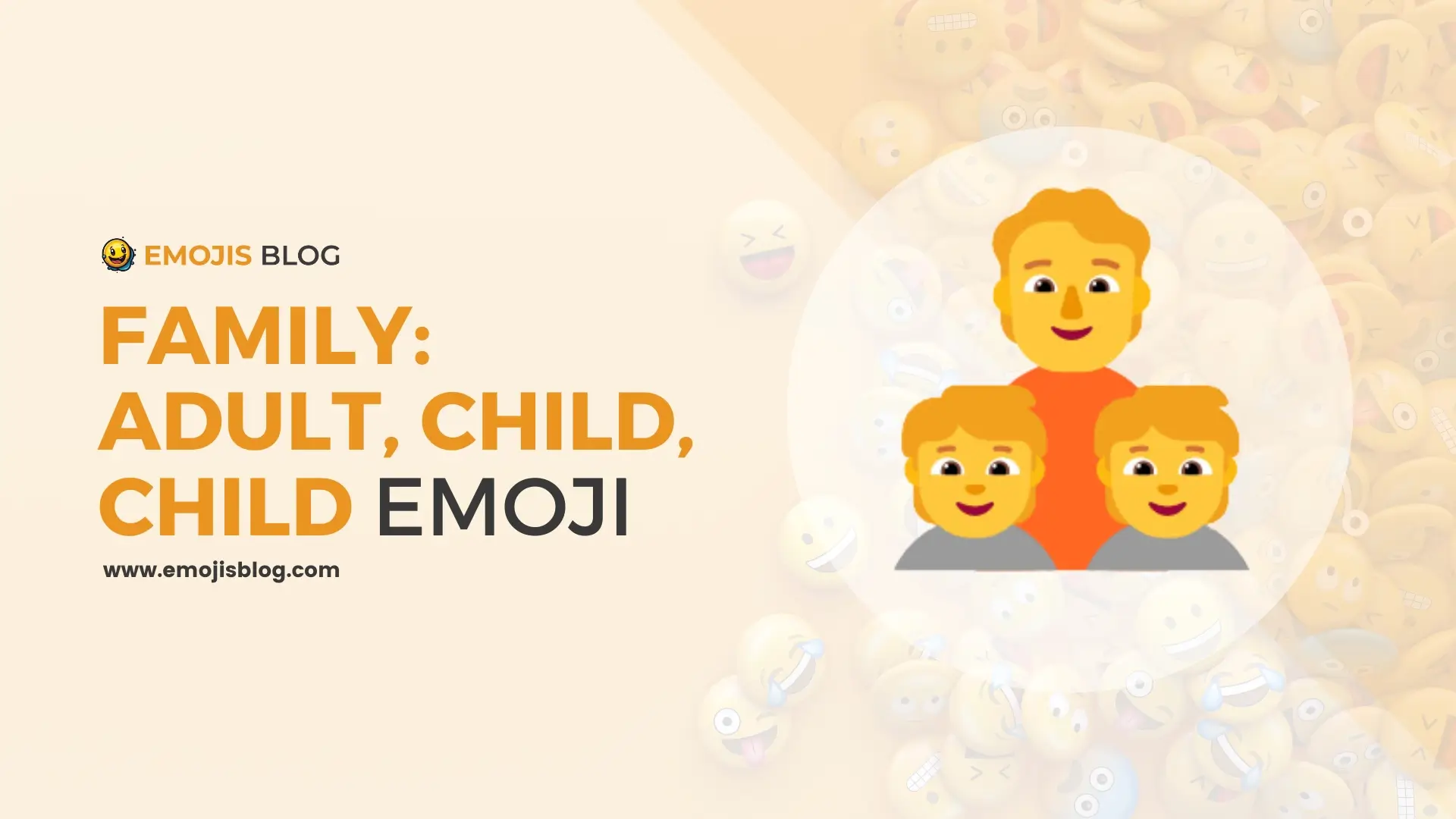What Does The Family: Adult, Child, Child Emoji 🧑🧒🧒 Mean?
🧑🧒🧒
Family: Adult, Child, Child Emoji 🧑🧒🧒 Meanings
The Family: Adult, Child, Child emoji 🧑🧒🧒 represents a single-parent family with two children, celebrating the diversity and inclusivity of modern family structures. It is designed to reflect different gender identities and skin tones, allowing for personalized representation across various platforms. Commonly used in social media, messaging, and marketing, this emoji helps individuals and brands convey family moments, inclusivity, and the unique dynamics of single-parent households. Its introduction and evolution underscore the growing recognition of varied family forms in digital communication.
Technical Information
| Attribute | Details |
|---|---|
| Unicode | U+1F9D1 U+200D U+1F9D2 U+200D U+1F9D2 |
| Name | Family: Adult, Child, Child |
| Shortcode | :adult_child_child: |
| Unicode Version | 12.0 |
| Introduced in Year | 2019 |
| Categories | People & Body, Family |
| Variations | Gender (Male, Female, Gender-neutral), Skin Tones |
| Platforms Supported | Apple, Google, Microsoft, Samsung, WhatsApp, Twitter, Facebook, etc. |
| Customization | Gender and skin tone customization available |
| Common Uses | Representing single-parent families, sharing family moments, inclusivity |
| Platform Differences | Slight variations in design, color, and character positioning |
Understanding the Family: Adult, Child, Child Emoji 🧑🧒🧒
Emojis have become an integral part of our digital communication, allowing us to express emotions, ideas, and concepts succinctly. Among these, family-related emojis hold special significance as they reflect diverse family structures and relationships. The Family: Adult, Child, Child emoji 🧑🧒🧒 is one such representation. This article delves into its meaning, variations, and usage in digital communication.
The Meaning of the Family: Adult, Child, Child Emoji
The Family: Adult, Child, Child emoji 🧑🧒🧒 symbolizes a family unit consisting of one adult and two children. This emoji is designed to represent a single-parent family with two children, acknowledging the diversity in modern family structures. It celebrates single-parent households, emphasizing inclusivity and recognition of different family dynamics.
Variations and Customization
Gender and Skin Tone Variations
The Family: Adult, Child, Child emoji can be customized to reflect different gender identities and skin tones. Platforms like Apple, Google, and Samsung offer variations where the adult can be depicted as male, female, or gender-neutral, and the children can also be of various genders. Additionally, users can select different skin tones to accurately represent their family.
Platform Differences
Different platforms may display this emoji slightly differently. For instance, the design on an iPhone might vary from that on an Android device. These variations can include differences in the style, color, and positioning of the characters, but the core representation remains consistent across platforms.
Usage in Digital Communication
Social Media and Messaging
The Family: Adult, Child, Child emoji is commonly used in social media posts, messages, and captions to denote family moments, celebrations, and announcements. It can be used to share family photos, holiday greetings, or milestones. For single parents, this emoji is a way to proudly represent their family structure.
Marketing and Advertising
Brands and advertisers also use family emojis, including the Family: Adult, Child, Child emoji, in their campaigns to connect with audiences on a personal level. By using this emoji, brands can convey family-friendly messages, promote products or services tailored for single-parent families, and highlight inclusivity.
The Evolution of Family Emojis
The introduction of family emojis has evolved to reflect changing societal norms and values. Initially, family emojis depicted traditional nuclear families with a mother, father, and children. However, recognizing the need for more inclusive representations, platforms have expanded their emoji offerings to include diverse family structures such as single-parent families, same-sex parent families, and multi-generational families.
Conclusion
The Family: Adult, Child, Child emoji 🧑🧒🧒 is a powerful symbol of inclusivity and recognition of diverse family structures in our society. Its usage in digital communication helps individuals and brands express their unique family dynamics, celebrate single-parent families, and promote inclusivity. As emojis continue to evolve, they play a crucial role in reflecting and shaping our understanding of modern family life.
Future of Family Emojis
The future of family emojis is likely to see even more diversity and customization options, reflecting the ongoing changes in societal norms and the growing recognition of various family forms. As technology advances, we can expect emojis to become even more personalized, allowing users to create representations that are even more accurate and inclusive of their unique family experiences.

